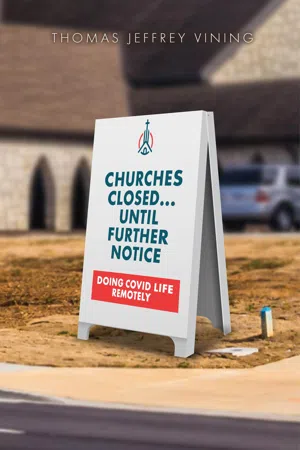![]()
Churches Closed...Until Further Notice
Doing COVID Life Remotely
actionable advice and best practices for the technologically challenged
Thomas Jeffrey Vining
Trilogy Christian Publishers
TUSTIN, CA
Trilogy Christian Publishers
A Wholly Owned Subsidiary of Trinity Broadcasting Network
2442 Michelle Drive
Tustin, CA 92780
Copyright © 2021 by Thomas Jeffrey Vining
All scripture quotations are taken from the Holy Bible, New International Version®, NIV®. Copyright © 1973, 1978, 1984, 2011 by Biblica, Inc.TM Used by permission of Zondervan. All rights reserved worldwide. www.zondervan.com. The “NIV” and “New International Version” are trademarks registered in the United States Patent and Trademark Office by Biblica, Inc.TM
No part of this book may be reproduced, stored in a retrieval system, or transmitted by any means without written permission from the author.
All rights reserved, including the right to reproduce this book or portions thereof in any form whatsoever.
For information, address Trilogy Christian Publishing
Rights Department, 2442 Michelle Drive, Tustin, Ca 92780.
Trilogy Christian Publishing/ TBN and colophon are trademarks of Trinity Broadcasting Network.
For information about special discounts for bulk purchases, please contact Trilogy Christian Publishing.
Manufactured in the United States of America
Trilogy Disclaimer: The views and content expressed in this book are those of the author and may not necessarily reflect the views and doctrine of Trilogy Christian Publishing or the Trinity Broadcasting Network.
10 9 8 7 6 5 4 3 2 1
Library of Congress Cataloging-in-Publication Data is available.
ISBN 978-1-63769-010-9
ISBN 978-1-63769-011-6 (ebook)
Contents
Dedication v
Preface: Can You Learn From Others? vii
Introduction xi
Prologue: Learning to Do Life Remotely! xii
Part I. What Just Happened? 1
Chapter 1. No More Alibis 3
Chapter 2. People Don’t Like Change Much 6
Chapter 3. Until Further Notice 8
Part II. Can You Learn to Thrive Online? 11
Chapter 4. Restaurants Survive by Natural
Selection 13
Chapter 5. When Did the Virtual Become
Virtuous? 15
Chapter 6. Digital Transformation and Avoiding
Panic Attacks 19
Chapter 7. Develop Competency Not
Collegiality 27
Part III. Managing Expectations 33
Chapter 8. You Volunteered, Now What? 35
Chapter 9. Stakeholder Management—Pilot Use
Cases 40
Chapter 10. You Cannot Change What You
Cannot Measure 44
Part IV. Quo Vadis? 47
Chapter 11. Doing Life Remotely 50
Chapter 12. What is User Interface and User
Experience? 56
Part V. The Workplace 59
Chapter 13. Is HIPAA Applicable? 61
Chapter 14. Vendor Selection—Best Practices 63
Chapter 15. GDPR and CCPA Compliance
Requires Action 68
Chapter 16. Cybersecurity—Best Practices for
Keeping Safe 73
Chapter 17. Virtual Private Networks—Best
Practices 78
Chapter 18. Ransomware—To Pay or Not
to Pay 82
Chapter 19. Conduct Web Conferences Until
Further Notice 86
Chapter 20. No More Identity Crisis 90
Chapter 21. When God Closes a Door, He Opens
a Window 93
Epilogue 96
Afterword 98
Biblography 99
Acknowledgements 104
About the Author 105
Dedication
This book is dedicated to my wife, Folake Vining, who epitomizes the Proverbs 31 standards. I love you.
preface
Can You Learn From Others?
In March of 2020, many worship styles and services changed forever. And it’s all due to a pandemic and technology.
This year, due to government mandates and public fear, many religious organizations (RO) began to test many strategies, theories and technologies for how best to remain viable in a virtual setting. As this digital transformation began to emerge, along came with it difficult questions for many ROs to answer. For example, what type of apps, how best to use cloud-based data, what is proper governance, and then how best to use social media platforms, what vendors should we hire and how can we develop engaging content for their audiences.
And then came mistakes, poor content, clunky technology, overpaying for vendors among a culture not really comfortable existing in the digital world.
Let me back up in time.
When I first began researching the IT industry and how to differentiate vendors in 2004, my only experience was by asking the users themselves. I assumed as an analyst that I could cull complete information from their experiences, expectations, and impressions. I quickly learned that was not the case at all. When I asked a user of a particular software vendor when and where do you think other organizations could benefit from this software product, I will never forget her “I really don’t know…” response.
Her absence of a meaningful reply taught me organizations select and use technology and vendors based on their own unique circumstances. In other words, I no longer assumed what I found as valuable would be valuable to others. Over the next f...

